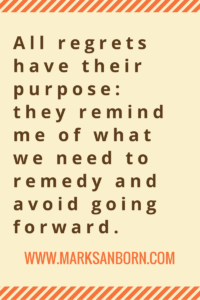 Frank Sinatra sang that even though he’d had regrets, they were too few to mention.
Frank Sinatra sang that even though he’d had regrets, they were too few to mention.
I’ve had more than a few business regrets and hopefully I’ve learned from them. I share some of them here in hopes that you can learn from my regrets so they won’t become your regrets.
1. Not giving people the benefit of the doubt
We give ourselves the benefit of the doubt, but are reluctant to give it to others. To avoid being hurt or disappointed, we quickly assume negative motives of others. I regret that I didn’t assume more positive unknown motives in others when I rushed to judgement.
2. Giving people the benefit of the doubt
That sounds contradictory but it isn’t. There have been times when I so wanted an employee to succeed or a relationship to work that I ignored numerous and repeated warnings. I regret that I over-extended giving benefit of the doubt and prolonged unnecessary suffering.
3. Not considering the backstory
One of my mottos: there is always a backstory. When we don’t know the backstory–the history or background behind what we are seeing–we make incorrect assumptions about why something happened or why someone behaved in a certain manner. I’ve found that what looked like an amazing success capable of making me envious was often not such a spectacular achievement once I learned the backstory. I’ve seen people who puzzled me with seemingly erratic behavior suddenly appear rational once I understood their backstory. It helps to dig a big before we draw a conclusion. And it also slows the race to reaching a conclusion.
4. Worrying too much about what others think
Some people wake up in the morning with the goal to be offended before the end of the day. Other people find reason to dislike you no matter what. Everything and anything you do is run through their filter of negativity. Why is it we try so hard to please the unappeasable? While I don’t believe in being inappropriately harsh or unfeeling, there are times we should accept that we have better reasons than what others think (or might think) for doing something.
5. Chasing rabbits instead of elephants
I got this turn of the phrase from my long time friend, Dr. Nido Qubein. I have had a tendency to aim too low, get caught up in lesser projects and not go after the real big game in my business. Do you have that problem too? Little things are fun, quick and easy to attain so pursuing them makes us feel better, but doesn’t help us become better. Going for bigger game and outsized numbers challenges us to not only attain more but achieve more significance.
6. Staying too busy
I’ve learned (the hard way) not to confuse activity with accomplishment. Results is a far superior metric than busyness. Activity is an input; results are an output. And if you’re too busy, you’ll not notice the opportunities that come your way. At the end of the day feeling tired from activity is inferior from feeling inspired by results.
7. Saying yes
I will give people credit for their boldness: I am often asked for free advice or other services. And in the spirit of generosity, I’ve often given freely…but sometimes to be greatly disappointed. I believe deeply in philanthropy, but it is always better pursued as a deliberate choice rather than the response to a random request. There is an opportunity cost to saying yes: it used resources that might have been better invested elsewhere.
8. Contact management
This is an operational regret on my part. I started my own business before there was easy, affordable contact management. What was available was very limited. Habit and laziness prevented me from taking advantage of database management as my business grew and software improved. Soon I was behind the curve and had lost lots of valuable client information. Do yourself and your business a favor: track and maintain your contacts.
Bonus regret: Intake versus retention
I’m an avid reader. I either skim or read one non-fiction book a week and probably read 20 books of fiction a year. For the non-fiction, I’ve developed a habit of highlighting and making notes. That’s good. The bad? I didn’t do enough frequent review to retain the ideas from these books as I would have liked.
True learning involves remembering. A good idea you can’t recall doesn’t help you improve yourself or build your business. Organize what you read and learn, and review periodically for retention.
When I inventory my regrets, I’m happy that there are relatively few big ones. My happy recollections are far greater in number than my regrets. But all regrets have their purpose: they remind me of what we need to remedy and avoid going forward. And by sharing, I hope my regrets help you minimize yours.
Interested in learning more?









